
A few months ago, I started waking up with a strange feeling in my jaw. It was sore, almost like I'd been clenching my teeth all night. At first, I thought it was just a side effect of stress, but as the days went by, the discomfort didn’t go away. I noticed my teeth were more sensitive too, and something wasn’t quite right. It wasn’t until a trip to the dentist that I learned I was grinding my teeth in my sleep—a condition called bruxism.
As it turns out, I wasn’t alone; many people deal with this issue without even realising it.
Bruxism can sneak up on you, often happening while you're in a deep sleep. It can lead to all kinds of issues, from jaw pain to worn-down teeth, but the good news is that it’s treatable. If you have similar symptoms, it's worth knowing the cause and how to stop it before it causes lasting harm.
In this article, we will explore bruxism, why it happens, and how you can get the help you need.
What is bruxism?
Bruxism is grinding or clenching your teeth without knowing it, usually in your sleep. It's a common issue. Yet, many don't realise it until they feel the effects, like sore jaws or sensitive teeth. It can also happen during the day, especially when you're stressed or focused.
Bruxism can damage your teeth over time. It can wear down enamel, cause cracks, and lead to jaw pain. It may start unnoticed, but it can become more problematic over time.
Causes of bruxism
A range of factors, from emotional stress to physical issues, can trigger bruxism. Stress, anxiety, and tension are common causes. They lead to tightness in the jaw muscles. Other causes can include sleep disorders, misaligned teeth, or even certain medications. Knowing these triggers can help manage the condition and prevent lasting damage.
- Emotional stress or anxiety
- Sleep disorders, like sleep apnoea,
- Misalignment of teeth or bite.
- Use of medications such as antidepressants.
- Excessive consumption of caffeine, alcohol, or tobacco.
Symptoms of bruxism
Bruxism often goes unnoticed. Many people grind their teeth in their sleep. The signs can be subtle at first, but over time, they start to build up and become harder to ignore.
If you wake up with discomfort in your teeth or jaw, it is worth considering whether bruxism might be the cause.You might also experience frequent headaches around the temples.
Your teeth may show signs of wear, including chips, cracks, or increased sensitivity.
Soreness in your face, neck, or shoulder muscles may be a sign that you’re grinding your teeth, as well as disrupted sleep or loud snoring.
Treatment for bruxism
When treating bruxism, the first step is to understand what is causing it. If stress or anxiety is a trigger, dentists recommend ways to reduce jaw tension. These include deep breathing, relaxation exercises, or even therapy.
Managing stress is key because it’s one of the most common causes of grinding. And regular exercise can also help relieve some of that built-up tension.
In many cases, dentists suggest wearing a custom-made mouthguard at night. It’s a simple but effective solution. The mouthguard protects your teeth from grinding at night. It prevents wear that could cause fractures or sensitivity.
If bruxism has caused damage, you may need crowns, fillings, or other repairs. This helps protect the teeth from further damage.
If misalignment is causing the grinding, dentists might recommend braces. They would fix your bite.
If jaw pain persists, TMJ therapy may help. It can relieve discomfort and restore function.
Prevention of bruxism
It's hard to prevent bruxism completely. But you can take steps to reduce the risk:
- Manage stress. Practice stress-reduction techniques to control your anxiety. Perform this task on a consistent basis.
- Maintain good sleep hygiene. Make your sleep space calm and restful. Avoid stimulants like caffeine before bed.
- Regular dental check-ups. See your dentist for signs of bruxism, such as worn enamel or jaw issues.
- Reduce strain on the jaw muscles. Avoid hard foods or excessive chewing, and don't chew hard objects like pens or ice.
Start your bruxism treatment today!
If you're dealing with the discomfort of bruxism, you don’t have to suffer in silence. Early treatment can prevent long-term damage. It can also improve your physical and mental well-being.
At Local Dental, we can help. We can find the right solution, whether it's stress management or a custom mouthguard. Don’t wait for the pain to get worse—book an appointment today and take the first step towards a healthier smile!
Go Back

















